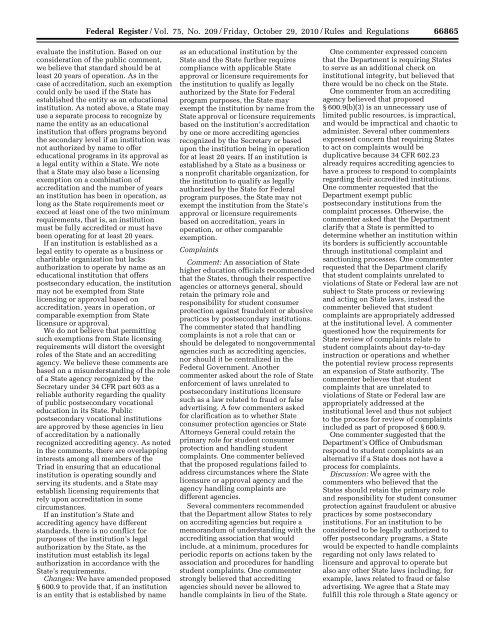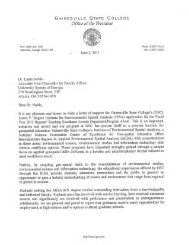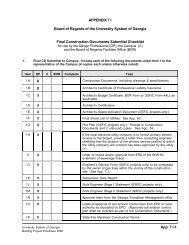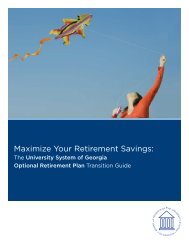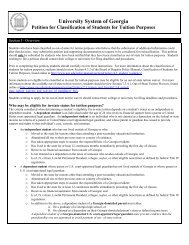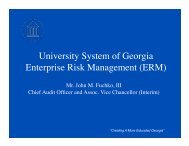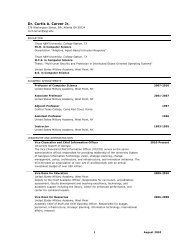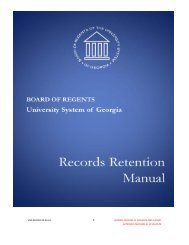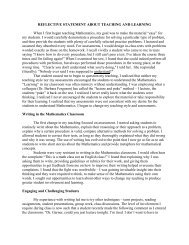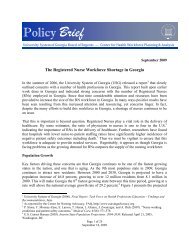66864 Federal Register / Vol. 75, No. 209 / Friday, October 29, 2010 / Rules and RegulationsWReier-Aviles on DSKGBLS3C1PROD with RULES2process that would lead to continualoversight by a State.Changes: None.Comment: Several commentersexpressed concern regarding thefinancial burden on the States to makechanges in State laws and the amount <strong>of</strong>time that would be needed to make thenecessary changes. Commenters fearedthat the States would most likely haveto reduce further State tax subsidiesprovided to public institutions. As aresult, costs will be increased forstudents at public institutions to coverlost revenues and increase costs for thetitle IV, HEA programs. One commenterstated that schools could delay progress<strong>of</strong> degree completion at State fundeduniversities because they will be forcedto reduce <strong>of</strong>ferings.Discussion: We do not believe that itwould impose an undue financialburden on States to comply with theprovisions in § 600.9. In most instanceswe believe that a State will already becompliant for most institutions in theState or will need to make minimalchanges to come into compliance. Thus,we do not agree with commenters whobelieved that the regulations wouldgenerally impact the funding <strong>of</strong> publicinstitutions in a State or wouldnecessitate a reduction in the <strong>of</strong>feringsat public institutions.Changes: None.Exemptions: Accreditation and Years <strong>of</strong>OperationComment: Several commenterssupported the existing practice bywhich a State bases an institution’s legalauthorization to <strong>of</strong>fer postsecondaryeducation upon its accreditation by anationally recognized accreditingagency, i.e., an accrediting agencyrecognized by the Secretary. Thecommenters believed that proposed§ 600.9 should be revised or clarified topermit existing practices allowingexemption by accreditation. Anothercommenter indicated that several Stateshave exempted accredited institutionsfrom State oversight unless thoseinstitutions run afoul <strong>of</strong> theiraccreditors’ requirements. Onecommenter believed that proposed§ 600.9 would require the creation <strong>of</strong>unnecessary, duplicative, andunaffordable new bureaucracies, andrecommended that its State shouldcontinue its partial reliance onnationally recognized accreditingagencies. Another commenter believedit appropriate that a State delegate someor all <strong>of</strong> its licensure function to anationally recognized accreditingagency provided that the State entersinto a written agreement with theaccrediting agency.One commenter stated that the<strong>Department</strong> should eliminate theambiguity about how much a State mayrely on accrediting agencies. Severalcommenters stated that the regulationsare confusing as to which exemptionsare permissible and which are not. Onecommenter believed that the<strong>Department</strong> should make it clear thatalthough a State is not prohibited fromrelying on accrediting agencies forquality assessments, the essential duties<strong>of</strong> State authorization cannot becollapsed into the separate requirementfor accreditation.Some commenters noted that aninstitution’s legal authorization may bebased on a minimum number <strong>of</strong> yearsthat an institution has been operating.One <strong>of</strong> the commenters cited aminimum number <strong>of</strong> years used byStates that ranged as low as 10 years <strong>of</strong>operation while two other commentersnoted that institutions had beenexempted in their State because theyhad been in operation over 100 yearsand were accredited. The commentersbelieved that the <strong>Department</strong> shouldconsider it acceptable for a State to relyon the number <strong>of</strong> years an institutionhas been operating.Some commenters did not think thatStates should be allowed to deferauthorization to accrediting agencies.One <strong>of</strong> these commenters believed thatbasing State authorization onaccreditation was contrary to law. Onecommenter believed that existing lawmakes clear that institutional eligibilityfor title IV, HEA programs is based onthe Triad <strong>of</strong> accreditation, Stateauthorization, and the Federalrequirements for administrativecapability and financial responsibility.As a result the commenter believed thatthe extent to which States may rely onaccrediting agencies should be clear andlimited. Along the same lines, anothercommenter believed strongly thataccrediting agencies should never beallowed to grant authorization tooperate in a State, and that furtherclarifications about the ways in whichaccrediting agencies may substitute forState agencies is necessary. Onecommenter encouraged the <strong>Department</strong>to study more carefully the role <strong>of</strong> Stateentities and accreditation agencies.Another commenter believed thatrelying on accrediting agencies to besurrogates for State authorization isinappropriate and should not be the soledeterminant for authorization. Onecommenter stated that accreditationmay not be accepted as a sufficient basisfor granting or continuing authorizationto operate and that the authorizationprocess must be independent <strong>of</strong> anyaccreditation process or decision.VerDate Mar2010 14:10 Oct 28, 2010 Jkt 223001 PO 00000 Frm 00034 Fmt 4701 Sfmt 4700 E:\FR\FM\29OCR2.SGM 29OCR2One commenter believed thatproposed § 600.9 would undermine therole <strong>of</strong> accreditation and the publicprivatepartnership and would call forStates to intrude into academic areas.The commenter believed that theproposed regulations would movetoward establishing accreditation as aState actor, a role that is incompatiblewith accreditation’s commitment to selfregulationand peer and pr<strong>of</strong>essionalreview. Another commenter believedthat the <strong>Department</strong> should make itclear that although a State is notprohibited from relying on accreditingagencies for quality assessments, theessential duties <strong>of</strong> State authorizationcannot be collapsed into the separaterequirement for accreditation. If aninstitution’s State and accreditingagency have different standards, onecommenter was concerned regardingwhich entity’s standards would beapplied.Discussion: While we recognize andshare the concerns <strong>of</strong> some commentersthat States should not be allowed todefer authorization to accreditingagencies, we believe that such a practicewould be permissible so long as it doesnot eliminate State oversight and clearlydistinguishes the responsibilities <strong>of</strong> theState and accreditor under such anarrangement. We also do not agree thatadditional study is needed <strong>of</strong> the roles<strong>of</strong> State entities and accrediting agenciesas we believe these relationships arewell understood.We believe that accreditation may beused to exempt an institution from otherState approval or licensing requirementsif the entity has been established byname as an educational institutionthrough a charter, statute, constitutionalprovision, or other action issued by anappropriate State entity to operateeducational programs beyond secondaryeducation, including programs leadingto a degree or certificate. For such aneducational institution, a State couldrely on accreditation to exempt theinstitution from further approval orlicensing requirements, but could not doso based upon a preaccredited orcandidacy status.We also agree with the commentersthat States may utilize an institution’syears in operation to exempt it fromState licensure requirements, but only,as with accreditation, for a legal entitythat the State establishes as aneducational institution authorized to<strong>of</strong>fer postsecondary education.However, we believe that there shouldbe a minimum standard for allowingyears <strong>of</strong> operation to exempt aninstitution to ensure that this exemptionis not set to a short period <strong>of</strong> time thatwould not provide a historical basis to
Federal Register / Vol. 75, No. 209 / Friday, October 29, 2010 / Rules and Regulations66865WReier-Aviles on DSKGBLS3C1PROD with RULES2evaluate the institution. Based on ourconsideration <strong>of</strong> the public comment,we believe that standard should be atleast 20 years <strong>of</strong> operation. As in thecase <strong>of</strong> accreditation, such an exemptioncould only be used if the State hasestablished the entity as an educationalinstitution. As noted above, a State mayuse a separate process to recognize byname the entity as an educationalinstitution that <strong>of</strong>fers programs beyondthe secondary level if an institution wasnot authorized by name to <strong>of</strong>fereducational programs in its approval asa legal entity within a State. We notethat a State may also base a licensingexemption on a combination <strong>of</strong>accreditation and the number <strong>of</strong> yearsan institution has been in operation, aslong as the State requirements meet orexceed at least one <strong>of</strong> the two minimumrequirements, that is, an institutionmust be fully accredited or must havebeen operating for at least 20 years.If an institution is established as alegal entity to operate as a business orcharitable organization but lacksauthorization to operate by name as aneducational institution that <strong>of</strong>ferspostsecondary education, the institutionmay not be exempted from Statelicensing or approval based onaccreditation, years in operation, orcomparable exemption from Statelicensure or approval.We do not believe that permittingsuch exemptions from State licensingrequirements will distort the oversightroles <strong>of</strong> the State and an accreditingagency. We believe these comments arebased on a misunderstanding <strong>of</strong> the role<strong>of</strong> a State agency recognized by theSecretary under 34 CFR part 603 as areliable authority regarding the quality<strong>of</strong> public postsecondary vocationaleducation in its State. Publicpostsecondary vocational institutionsare approved by these agencies in lieu<strong>of</strong> accreditation by a nationallyrecognized accrediting agency. As notedin the comments, there are overlappinginterests among all members <strong>of</strong> theTriad in ensuring that an educationalinstitution is operating soundly andserving its students, and a State mayestablish licensing requirements thatrely upon accreditation in somecircumstances.If an institution’s State andaccrediting agency have differentstandards, there is no conflict forpurposes <strong>of</strong> the institution’s legalauthorization by the State, as theinstitution must establish its legalauthorization in accordance with theState’s requirements.Changes: We have amended proposed§ 600.9 to provide that, if an institutionis an entity that is established by nameas an educational institution by theState and the State further requirescompliance with applicable Stateapproval or licensure requirements forthe institution to qualify as legallyauthorized by the State for Federalprogram purposes, the State mayexempt the institution by name from theState approval or licensure requirementsbased on the institution’s accreditationby one or more accrediting agenciesrecognized by the Secretary or basedupon the institution being in operationfor at least 20 years. If an institution isestablished by a State as a business ora nonpr<strong>of</strong>it charitable organization, forthe institution to qualify as legallyauthorized by the State for Federalprogram purposes, the State may notexempt the institution from the State’sapproval or licensure requirementsbased on accreditation, years inoperation, or other comparableexemption.ComplaintsComment: An association <strong>of</strong> Statehigher education <strong>of</strong>ficials recommendedthat the States, through their respectiveagencies or attorneys general, shouldretain the primary role andresponsibility for student consumerprotection against fraudulent or abusivepractices by postsecondary institutions.The commenter stated that handlingcomplaints is not a role that can orshould be delegated to nongovernmentalagencies such as accrediting agencies,nor should it be centralized in theFederal Government. Anothercommenter asked about the role <strong>of</strong> Stateenforcement <strong>of</strong> laws unrelated topostsecondary institutions licensuresuch as a law related to fraud or falseadvertising. A few commenters askedfor clarification as to whether Stateconsumer protection agencies or StateAttorneys General could retain theprimary role for student consumerprotection and handling studentcomplaints. One commenter believedthat the proposed regulations failed toaddress circumstances where the Statelicensure or approval agency and theagency handling complaints aredifferent agencies.Several commenters recommendedthat the <strong>Department</strong> allow States to relyon accrediting agencies but require amemorandum <strong>of</strong> understanding with theaccrediting association that wouldinclude, at a minimum, procedures forperiodic reports on actions taken by theassociation and procedures for handlingstudent complaints. One commenterstrongly believed that accreditingagencies should never be allowed tohandle complaints in lieu <strong>of</strong> the State.VerDate Mar2010 14:10 Oct 28, 2010 Jkt 223001 PO 00000 Frm 00035 Fmt 4701 Sfmt 4700 E:\FR\FM\29OCR2.SGM 29OCR2One commenter expressed concernthat the <strong>Department</strong> is requiring Statesto serve as an additional check oninstitutional integrity, but believed thatthere would be no check on the State.One commenter from an accreditingagency believed that proposed§ 600.9(b)(3) is an unnecessary use <strong>of</strong>limited public resources, is impractical,and would be impractical and chaotic toadminister. Several other commentersexpressed concern that requiring Statesto act on complaints would beduplicative because 34 CFR 602.23already requires accrediting agencies tohave a process to respond to complaintsregarding their accredited institutions.One commenter requested that the<strong>Department</strong> exempt publicpostsecondary institutions from thecomplaint processes. Otherwise, thecommenter asked that the <strong>Department</strong>clarify that a State is permitted todetermine whether an institution withinits borders is sufficiently accountablethrough institutional complaint andsanctioning processes. One commenterrequested that the <strong>Department</strong> clarifythat student complaints unrelated toviolations <strong>of</strong> State or Federal law are notsubject to State process or reviewingand acting on State laws, instead thecommenter believed that studentcomplaints are appropriately addressedat the institutional level. A commenterquestioned how the requirements forState review <strong>of</strong> complaints relate tostudent complaints about day-to-dayinstruction or operations and whetherthe potential review process representsan expansion <strong>of</strong> State authority. Thecommenter believes that studentcomplaints that are unrelated toviolations <strong>of</strong> State or Federal law areappropriately addressed at theinstitutional level and thus not subjectto the process for review <strong>of</strong> complaintsincluded as part <strong>of</strong> proposed § 600.9.One commenter suggested that the<strong>Department</strong>’s <strong>Office</strong> <strong>of</strong> Ombudsmanrespond to student complaints as analternative if a State does not have aprocess for complaints.Discussion: We agree with thecommenters who believed that theStates should retain the primary roleand responsibility for student consumerprotection against fraudulent or abusivepractices by some postsecondaryinstitutions. For an institution to beconsidered to be legally authorized to<strong>of</strong>fer postsecondary programs, a Statewould be expected to handle complaintsregarding not only laws related tolicensure and approval to operate butalso any other State laws including, forexample, laws related to fraud or falseadvertising. We agree that a State mayfulfill this role through a State agency or
- Page 1 and 2: Friday,October 29, 2010Part IIDepar
- Page 3 and 4: Federal Register / Vol. 75, No. 209
- Page 6 and 7: 66836 Federal Register / Vol. 75, N
- Page 8 and 9: 66838 Federal Register / Vol. 75, N
- Page 10 and 11: WReier-Aviles on DSKGBLS3C1PROD wit
- Page 12 and 13: 66842 Federal Register / Vol. 75, N
- Page 14 and 15: 66844 Federal Register / Vol. 75, N
- Page 16 and 17: WReier-Aviles on DSKGBLS3C1PROD wit
- Page 18 and 19: 66848 Federal Register / Vol. 75, N
- Page 20 and 21: 66850 Federal Register / Vol. 75, N
- Page 22 and 23: WReier-Aviles on DSKGBLS3C1PROD wit
- Page 24 and 25: 66854 Federal Register / Vol. 75, N
- Page 26 and 27: WReier-Aviles on DSKGBLS3C1PROD wit
- Page 28 and 29: 66858 Federal Register / Vol. 75, N
- Page 30 and 31: 66860 Federal Register / Vol. 75, N
- Page 32 and 33: 66862 Federal Register / Vol. 75, N
- Page 36 and 37: 66866 Federal Register / Vol. 75, N
- Page 38 and 39: WReier-Aviles on DSKGBLS3C1PROD wit
- Page 40 and 41: WReier-Aviles on DSKGBLS3C1PROD wit
- Page 42 and 43: 66872 Federal Register / Vol. 75, N
- Page 44 and 45: WReier-Aviles on DSKGBLS3C1PROD wit
- Page 46 and 47: WReier-Aviles on DSKGBLS3C1PROD wit
- Page 48 and 49: WReier-Aviles on DSKGBLS3C1PROD wit
- Page 50 and 51: 66880 Federal Register / Vol. 75, N
- Page 52 and 53: WReier-Aviles on DSKGBLS3C1PROD wit
- Page 54 and 55: 66884 Federal Register / Vol. 75, N
- Page 56 and 57: 66886 Federal Register / Vol. 75, N
- Page 58 and 59: WReier-Aviles on DSKGBLS3C1PROD wit
- Page 60 and 61: WReier-Aviles on DSKGBLS3C1PROD wit
- Page 62 and 63: WReier-Aviles on DSKGBLS3C1PROD wit
- Page 64 and 65: WReier-Aviles on DSKGBLS3C1PROD wit
- Page 66 and 67: WReier-Aviles on DSKGBLS3C1PROD wit
- Page 68 and 69: WReier-Aviles on DSKGBLS3C1PROD wit
- Page 70 and 71: WReier-Aviles on DSKGBLS3C1PROD wit
- Page 72 and 73: 66902 Federal Register / Vol. 75, N
- Page 74 and 75: WReier-Aviles on DSKGBLS3C1PROD wit
- Page 76 and 77: WReier-Aviles on DSKGBLS3C1PROD wit
- Page 78 and 79: 66908 Federal Register / Vol. 75, N
- Page 80 and 81: WReier-Aviles on DSKGBLS3C1PROD wit
- Page 82 and 83: 66912 Federal Register / Vol. 75, N
- Page 84 and 85:
WReier-Aviles on DSKGBLS3C1PROD wit
- Page 86 and 87:
66916 Federal Register / Vol. 75, N
- Page 88 and 89:
WReier-Aviles on DSKGBLS3C1PROD wit
- Page 90 and 91:
WReier-Aviles on DSKGBLS3C1PROD wit
- Page 92 and 93:
WReier-Aviles on DSKGBLS3C1PROD wit
- Page 94 and 95:
66924 Federal Register / Vol. 75, N
- Page 96 and 97:
WReier-Aviles on DSKGBLS3C1PROD wit
- Page 98 and 99:
66928 Federal Register / Vol. 75, N
- Page 100 and 101:
WReier-Aviles on DSKGBLS3C1PROD wit
- Page 102 and 103:
66932 Federal Register / Vol. 75, N
- Page 104 and 105:
WReier-Aviles on DSKGBLS3C1PROD wit
- Page 106 and 107:
66936 Federal Register / Vol. 75, N
- Page 108 and 109:
66938 Federal Register / Vol. 75, N
- Page 110 and 111:
66940 Federal Register / Vol. 75, N
- Page 112 and 113:
66942 Federal Register / Vol. 75, N
- Page 114 and 115:
66944 Federal Register / Vol. 75, N
- Page 116 and 117:
66946 Federal Register / Vol. 75, N
- Page 118 and 119:
WReier-Aviles on DSKGBLS3C1PROD wit
- Page 120 and 121:
WReier-Aviles on DSKGBLS3C1PROD wit
- Page 122 and 123:
WReier-Aviles on DSKGBLS3C1PROD wit
- Page 124 and 125:
66954 Federal Register / Vol. 75, N
- Page 126 and 127:
WReier-Aviles on DSKGBLS3C1PROD wit
- Page 128 and 129:
66958 Federal Register / Vol. 75, N
- Page 130 and 131:
66960 Federal Register / Vol. 75, N
- Page 132 and 133:
WReier-Aviles on DSKGBLS3C1PROD wit
- Page 134 and 135:
WReier-Aviles on DSKGBLS3C1PROD wit
- Page 136 and 137:
WReier-Aviles on DSKGBLS3C1PROD wit
- Page 138 and 139:
66968 Federal Register / Vol. 75, N
- Page 140 and 141:
66970 Federal Register / Vol. 75, N
- Page 142 and 143:
66972 Federal Register / Vol. 75, N
- Page 144 and 145:
66974 Federal Register / Vol. 75, N


